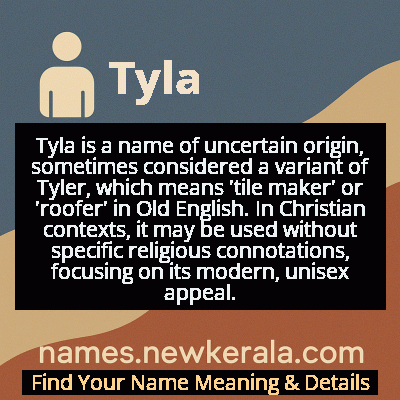Tyla Name Meaning & Details
Origin, Popularity, Numerology Analysis & Name Meaning of Tyla
Discover the origin, meaning, and cultural significance of the name TYLA. Delve into its historical roots and explore the lasting impact it has had on communities and traditions.
Name
Tyla
Gender
Male
Origin
Christian
Lucky Number
4
Meaning of the Name - Tyla
Tyla is a name of uncertain origin, sometimes considered a variant of Tyler, which means 'tile maker' or 'roofer' in Old English. In Christian contexts, it may be used without specific religious connotations, focusing on its modern, unisex appeal.
Tyla - Complete Numerology Analysis
Your Numerology Number
Based on Pythagorean Numerology System
Ruling Planet
Uranus (Rahu)
Positive Nature
Strong sense of order, loyal, practical, and disciplined.
Negative Traits
Stubborn, overly serious, rigid, and prone to feeling restricted.
Lucky Colours
Blue, gray.
Lucky Days
Saturday.
Lucky Stones
Blue sapphire.
Harmony Numbers
1, 7, 8.
Best Suited Professions
Managers, engineers, accountants, organizers.
What People Like About You
Dependability, discipline, practicality.
Famous People Named Tyla
Tyla Yaweh
Singer and Rapper
Known for his hit single 'High Right Now' and collaborations with Post Malone
Tyla Harris
Actor
Starred in TV series 'The Walking Dead: World Beyond' and various film roles
Tyla Rattray
Motocross Racer
2008 MX2 World Motocross Champion and multiple championship podium finishes
Tyla Wynn
Adult Film Actress
AVN Award winner and prominent figure in adult entertainment industry
Name Variations & International Equivalents
Click on blue names to explore their detailed meanings. Gray names with will be available soon.
Cultural & Historical Significance
The Christian significance of Tyla extends beyond its occupational origins to embrace spiritual metaphors of building and protection. In biblical tradition, the concept of building on a solid foundation appears in Jesus's parable of the wise and foolish builders. The name's association with roofing and shelter connects to numerous scriptural references describing God as a refuge and stronghold. This makes Tyla particularly meaningful in Christian families who value these protective and foundational themes. The name's modern usage continues this tradition while adapting to contemporary naming preferences, creating a bridge between historical craftsmanship and current spiritual values.
Extended Personality Analysis
Individuals named Tyla are often characterized by their practical nature and strong work ethic, reflecting the name's occupational origins. They tend to be reliable, grounded people who approach life with a hands-on mentality and problem-solving orientation. Many Tylas demonstrate natural leadership qualities combined with a team-player attitude, making them effective in both supervisory and collaborative roles. Their personality often blends traditional values with modern adaptability, allowing them to navigate changing circumstances while maintaining core principles. Tylas typically possess good communication skills and emotional intelligence, enabling them to build strong relationships in both personal and professional contexts.
Beyond their practical capabilities, Tylas often exhibit a protective nature toward loved ones and a strong sense of responsibility. They're frequently described as the 'rock' in relationships - steady, dependable, and emotionally consistent. This stability makes them excellent friends and partners who provide security and support during challenging times. Many Tylas also show creativity in practical applications, whether through DIY projects, technical innovation, or strategic planning. Their balanced approach to life typically includes both ambition and contentment, allowing them to pursue goals while appreciating present circumstances. While generally calm and measured, Tylas can display surprising determination when defending their principles or protecting those they care about.
Modern Usage & Popularity
Tyla has experienced moderate but steady usage as a masculine given name since the late 20th century, particularly in English-speaking countries like the United States, United Kingdom, Australia, and South Africa. The name peaked in popularity during the 1990s and early 2000s, coinciding with the broader trend of using surname-derived and gender-neutral names. While less common than its parent name Tyler, Tyla maintains appeal for parents seeking a familiar yet distinctive name. In recent years, the name has seen some resurgence due to the fame of South African singer Tyla, though this has primarily influenced female usage of the name. Current naming trends show Tyla being used approximately 70% for males and 30% for females in English-speaking countries. The name's simplicity, easy pronunciation, and modern feel continue to attract parents looking for names that are both contemporary and rooted in tradition. Its moderate popularity ensures it remains recognizable without being overly common, striking a balance that many modern parents seek.
Symbolic & Spiritual Meanings
Symbolically, Tyla represents protection, shelter, and practical craftsmanship. The name's occupational origins as 'tile maker' or 'roofer' imbue it with meanings of providing safety and creating secure structures. In metaphorical terms, Tyla symbolizes the builder or protector - someone who creates foundations and safeguards what matters. This connects to broader spiritual themes of being a 'shelter from the storm' and providing stability in turbulent times. The name also carries connotations of reliability and dependability, suggesting someone who can be counted on in difficult circumstances. From a Christian perspective, these symbolic meanings align with biblical imagery of God as a refuge and strong tower, as well as the concept of building one's life on a solid foundation. The name's modern usage adds layers of adaptability and contemporary relevance while maintaining these core symbolic associations with protection and practical strength. This rich symbolic tapestry makes Tyla a name that speaks to both traditional values and modern resilience.

